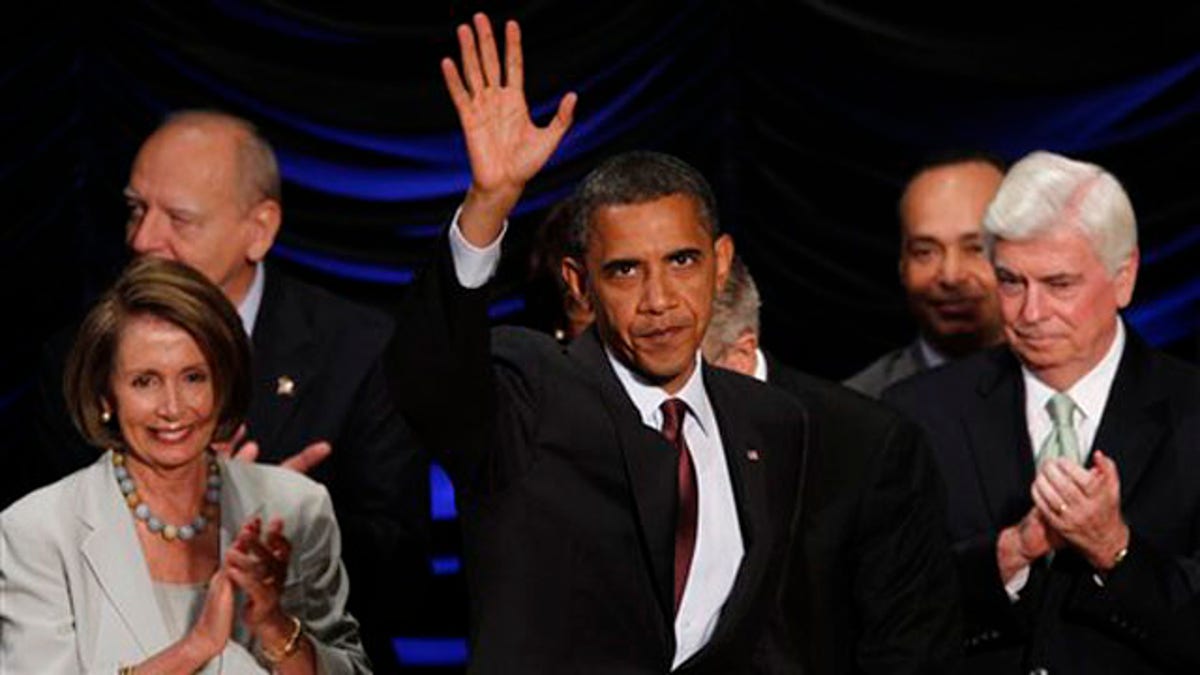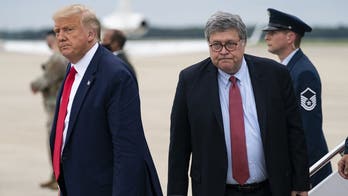
President Obama takes the stage before signing the Dodd-Frank Wall Street Reform and Consumer Protection financial reform bill in Washington July 21. (AP Photo)
Pledging "no more" Wall Street bailouts, President Obama on Wednesday signed into law a sweeping overhaul of financial regulations, saying the complex measures would ultimately help consumers make better decisions and help keep the economy out of serious trouble.
The president called the law the "strongest consumer financial protections in history." He said the law would ensure that taxpayers "never again" have to foot the bill for Wall Street's mistakes.
"There will be no more tax-funded bailouts -- period," he said.
The ceremony marked a signature achievement for the president in his second year, though the package was staunchly opposed by most Republicans in both chambers. GOP lawmakers portrayed the bill as a burden on small banks and businesses and argued it would cost consumers and hinder job growth.
"Millions of Americans are struggling to find jobs, and yet all they see in Washington are Democrats passing massive bills that, at their core, seem to have one thing in common: more job loss," Republican Minority Leader Mitch McConnell said on the Senate floor Wednesday.
Rep. Darrell Issa, R-Calif., accused the president of ignoring the role mortgage giants Fannie Mae and Freddie Mac played in the economic crisis that flared in 2008, sinking the country's economy into recession.
"President Obama's bill-signing charade represents nothing more than an absolute betrayal and abdication of what presidential leadership is supposed to embody," Issa said.
But Obama said risky Wall Street behavior and a "breakdown" in the financial system more than anything caused the crisis. He accused Republicans and interest groups of playing politics with the legislation. He described Republicans as a "partisan minority determined to block change," though he thanked the three GOP senators who voted with Democrats for the bill.
The new bill aims to usher in a new era of consumer protections and banking restrictions. The law assembles a powerful council of regulators to be on the lookout for risks across the finance system and creates a new agency to guard consumers in their financial transactions. It places shadow financial markets that previously escaped the oversight of regulators under new scrutiny and gives the government new powers to break up companies that threaten the economy.
Large, failing financial institutions would be liquidated and the costs assessed on their surviving peers. Borrowers will be protected from hidden fees and abusive terms, but also will have to provide evidence that they can repay their loans. The Federal Reserve will get new powers while at the same time coming under expanded congressional oversight.
Though Obama and his top officials urged Congress to pass the law while the memory of the 2008 financial meltdown was still fresh, many of the law's provisions won't take effect for at least a year as regulators scramble to write new rules and implement them.
"That will take some time, but it is worth it," Deputy Treasury Secretary Neal Wolin said Tuesday.
While the bill represents the end of a year's work by Congress and the administration, Obama has at least one contentious remnant from the bill to address. He must still nominate a director to the independent consumer protection bureau, an agency that became one of the bill's flashpoints and was attacked by Republicans as a broad expansion of government power over private business.
Among those expected at the signing ceremony is Elizabeth Warren, the Harvard law professor considered a leading candidate for the job. Warren is a consumer advocate who was among the first to propose the idea of a new agency to protect financial consumers. As head of the Congressional Oversight Panel for the government's $700 billion Troubled Asset Relief Program, the bank rescue fund known as TARP, she has periodically clashed with Treasury Secretary Timothy Geithner.
Liberals and unions have been aggressively pressing for her appointment. Richard Trumka, president of the AFL-CIO trade union federation, was among the latest to weigh in on behalf of Warren Tuesday, saying she is the only candidate "uniquely qualified and equipped to head this new agency."
But opposition in the Senate could make her confirmation difficult, a point made by Senate Banking Committee Chairman Christopher Dodd in a radio interview on NPR Monday.
Also under serious consideration by the White House is assistant Treasury secretary Michael Barr, one of the architects of the financial regulation bill and a close ally of some White House officials. Deputy assistant attorney general Eugene Kimmelman is also in the running for the slot.
The Associated Press contributed to this report.




